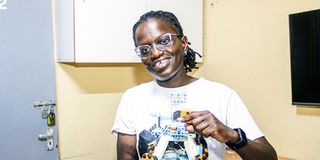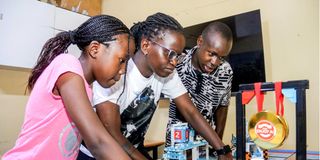Renice Otieno: Empowering youth through magic of coding

Code with Kids Founder Renice Otieno pictured on December 11th 2024 at Olympic area in Kibera Nairobi.
At the Code with Kids Africa centre in Kibera, a group of children, brimming with excitement, huddle around computers, their hands eager to learn coding, robotics, and everything technology-related.
“I have always liked playing with computers,” recalls 12-year-old Jenny Fair, who has been attending classes at the centre for the past two years – every Saturday during school terms. Her mother’s encouragement led her to explore the world of coding.
Jenny’s technological adventure began with Scratch, a beginner-friendly programming platform designed to introduce children to the basics of coding. However, she quickly progressed beyond simple game programming, diving into the intricate world of robotics.
Her proudest achievement to date is a project called “Closing Ceremony,” featuring a particularly impressive element – programmed fireworks – showcasing her growing technical skills. Her approach to learning is both systematic and playful, using mathematical principles to guide her robotic programming.
One of her most exciting projects involves using black line sensors to program robots to follow specific paths. The 12-year-old aims to become a game developer, with dreams of creating complex games like Need for Speed: Car Racing.
“The cybers in Kibera were always male-dominated,” shares Renice Otieno, the founder of Code with Kids. “My aunt didn’t understand why, at 16 years old, I was so drawn to computers.” Technology for her back then represented more than just machines – it was a language of possibility, a tool for transformation.
In 2016, she returned to Kibera with a mission. This was after financial constraints led her to pursue a diploma in Information, Communication and Technology (ICT) at Nairobi Aviation instead of going to university. But this didn’t dampen her spirit.
Starting small, she began teaching children from her aunt’s house – a choice that immediately built trust with local parents. Her initial programme, Coded Girls, soon evolved into Coded Kids.
“We don’t just teach coding,” Renice explains. “We help children discover how technology can amplify their existing passions.” This approach means a child interested in dance might learn to create dance-related tech projects, while another passionate about crocheting could use AI to generate intricate patterns.
While most technology programmes start at six or seven, Renice’s team begins as early as four. This decision came after observing young children’s curiosity and potential. “Age is just a number in tech,” she says. “We’ve seen three-year-olds competing in robotics competitions and surprising everyone.”
But how does she break down complex technology information?
“We break down all these complex concepts into simple things. For example, a variable. When we are training young kids in relation to something like a variable, we use the concept of a water bottle. A variable is just a container that stores data, so we use a water bottle to explain: you can add to it, remove from it. When it’s half full, you can still add to it.”

Code with Kids Founder Renice Otieno (Centre) taking Jenny Fair(left) and Omar Mohamed through some coding lessons on December 11th 2024 at Olympic area in Kibera Nairobi.
Another example:
“For a conditional statement, we explain: if you’re sent to the shop to buy mandazi, and then you’re told, if you don’t get mandazi, buy bread. That’s a conditional statement: if this is false, do this. But if this is true, do this. Giving them such relatable examples enables them to have fun while learning and understand the concepts better.”
Sessions at the centre cost Sh50, but when some children can’t afford even this modest fee, they have a strict policy: never turn a child away.
“If a child comes with 10 or 20 shillings, we work out a plan,” Renice says. The centre subsidises these costs through a clever approach: a for-profit wing that works with schools and homeschoolers outside Kibera, which then supports their community impact work.
Code with Kids reaches far beyond Kibera. They’ve conducted sessions in diverse locations, including Kilgoris, Kajiado, Makueni, Lodwar, Turkana, and even the Kakuma Refugee Camp.
Over 3,700 learners have gone through the Code with Kids programme, with courses spanning game design, web design, app development, blockchain technology, Artificial Intelligence (AI), robotics, and science experiments. Another student, Julius Juma, who started at age six, is already considered one of their best game developers while still in Form 1. At 16, he has developed three games – Ducklings, Crazy Cars, and a Flappy Bird-inspired game – which demonstrate his range and creativity. The games, however, are yet to be published due to a lack of funds.
His passion for game development stems from a desire to create more than just entertainment – he wants to solve real-world problems. “I could develop a game that could effectively solve a real-life issue,” he says.
At an engineering fair earlier this year, 16-year-old Omar Mohammed’s project got him noticed by Code with Kids founder Renice. The Form 2 student, who has undergone the Code with Kids programme, is now pursuing a software development course.
“She told me she saw my potential. I have a passion for what I’m doing,” Omar says.
His journey began with zero knowledge of robotics but an abundance of curiosity. “Before coming to Code with Kids, I didn’t know anything about robotics,” he explains. Now, he’s not just learning but actively preparing for the Enjoy AI competition in China, working on a robot that must complete specific tasks within a given time frame.
Omar dreams of becoming an ethical hacker. However, he faults the Kenyan education system for not prioritising individual passions.
Significant milestone
Eight years down the line, Code with Kids’ most significant milestone came with international recognition. Twenty-four selected students are preparing to represent Kenya in the Enjoy AI Global Competition in China – a first for many of these children. “Most of these kids will be first-time passport holders, first-time aeroplane travellers,” Renice says. “It’s about more than competition. It’s about expanding their vision of what’s possible.”
Renice’s own journey of growth has been equally transformative. Participating in the Visa She’s Next mentorship programme taught her critical leadership lessons, particularly about delegation and scaling her vision.
“I realised I can’t be the sole bearer of this mission,” she reflects. “We’re now training more educators from different communities to make STEM education accessible beyond Kibera.”
The centre has 15 educators and six volunteers.
“STEM is about lifelong learning,” she says. “With technology constantly evolving, we’re preparing children not just for careers, but for a world of continuous exploration and innovation.”


